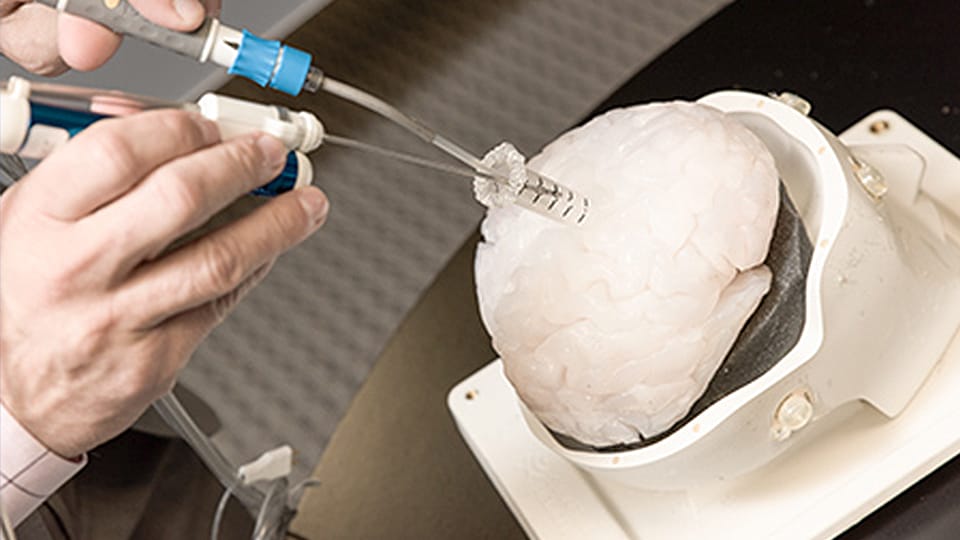NICO Corp. gets big neurosurgery win, ponders company’s future
Subscriber Benefit
As a subscriber you can listen to articles at work, in the car, or while you work out. Subscribe Now
Jim Pearson finally has the big win he has been seeking for eight years. Now, with his investors and board, he has a huge decision to make.
Pearson’s company, Indianapolis-based NICO Corp., recently wrapped up a large clinical trial that tested the company’s minimally invasive tools and technology for brain surgery in patients with hemorrhagic stroke.
Two million people suffer hemorrhagic strokes each year, and up to half of them die within 30 days.
What NICO is doing is trying to shift the way surgeons treat patients who have suffered from strokes. The company has developed a line of products that allow surgeons to reach into the brain in a way that’s less intrusive than the traditional way of cutting through the inner “white matter” and pulling delicate tissue apart with retractors to reach blood and other fluid that needs to be removed.
It sponsored a clinical trial led by Emory University of 300 patients with brain hemorrhages. The trial, which was interrupted by the COVID-19 pandemic, released the results this month, with an article published by The New England Journal of Medicine.
According to the results, the trial, known as Enrich, met the primary endpoint, demonstrating that patients treated with NICO’s technology achieved a statistically significant and clinically meaningful improvement over patients who were managed medically.
After six months, patients in the surgery group showed functional outcomes with a 98.1% probability of superiority over medical management.
For Pearson, NICO’s CEO, the positive trial outcome and an article published in one of the world’s most prestigious medical journals represented a game-changer for his 17-year-old company.
“No one else has ever developed a minimally invasive option to get to the brain,” he said. “This was the last major organ in the human body without a minimally invasion option.”
The company spent about $11 million on the trials, which it regarded as something of a make-or-break moment. NICO also has tools for brain tumors and other abnormalities. But the results of the hemorrhagic stroke trial are the biggest news in the company’s history.
It also means NICO’s sales reps will have an extra credential when they call on hospitals, neurosurgeons and other potential customers: a glowing article from the New England Journal tucked under their arm.
But the company, with only about 20 sales reps, needs to get bigger in a hurry, Pearson said.
So, now he has a big decision: Should the company ramp up on its own, or find a bigger partner?
Even now, his phone is ringing with calls from potential buyers interested in acquiring the company. But he said he’s also getting calls from venture capitalists who want to fund the growth and help keep the company independent.
NICO, based on East 96th St., in Carmel, is the latest life science company to push for huge growth. But it also might become the next to get plucked up by an out-of-state buyer.
“I think we’ll know that answer in the next six to 12 months, for sure,” Pearson said. “We’ll pick a path and that’ll become apparent to the public and to our shareholders.”
To date, NICO, which is short for Neurosurgical Intervention Co., has raised $62 million to develop its tools and hire a workforce of 64 people.
The company, founded in 2007, has trained more than 1,500 surgeons at dozens of hospitals, including the Cleveland Clinic, Indiana University Health, University of Michigan Health and Stanford University Medical Center. Altogether, they have performed more than 40,000 procedures. The Food and Drug Administration gave the green light to NICO for its medical devices in a series of approvals.
Yet NICO is struggling to turn an annual profit. Pearson said the past quarter was profitable, but the company will not be profitable this year. Sales last year were about $30 million, with double-digit revenue growth.
“The underlying theme is we have to get bigger,” Pearson said. “…We’re the smallest what I would call legitimate neurosurgery company, and most companies have 150 sales reps. We have 20, 22. So that’s our next step. How do we get there?”
Jim Pearson will talk more about the results of the clinical trial on this weekend’s edition of Inside INdiana Business with Gerry Dick.
